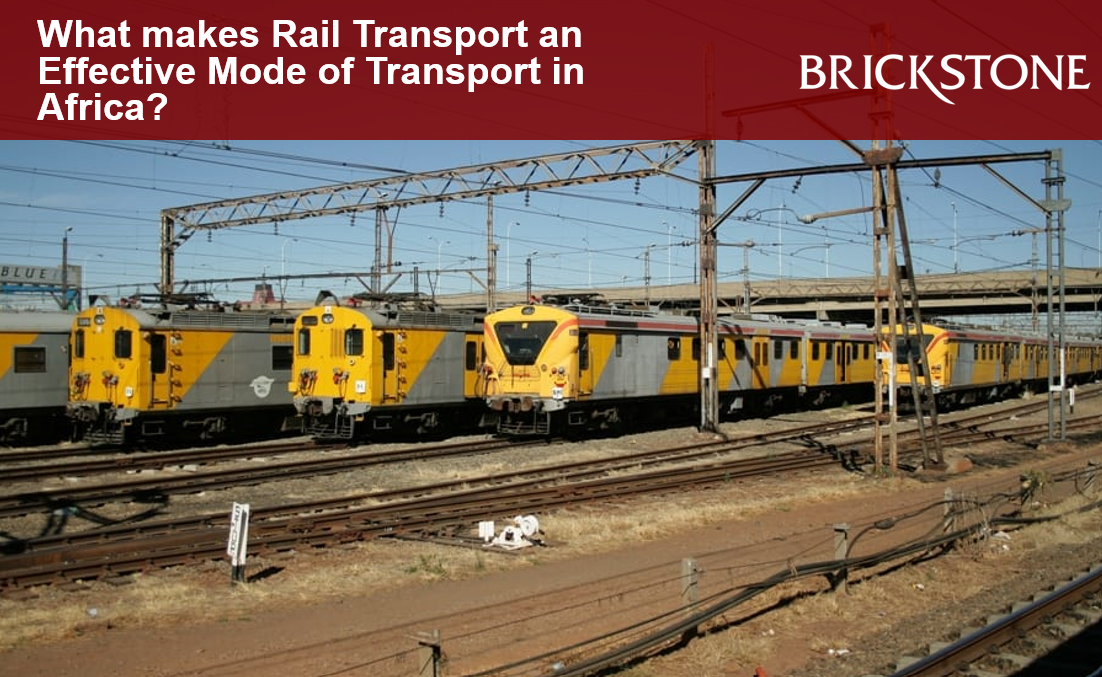What makes Rail Transport an Effective Mode of Transport in Africa?
Rail Transport in Africa
Driven by a fast- growing demographic and a large- scale urbanization, Africa is currently experiencing an unprecedented economic recovery, with strong growth projections over the next three to four decades. According to the AfDB, the operation of new mines, gas and oil fields, as well as the increase in intra-regional and international trade, are additional growth factors.
The transport sector, particularly rail transport, can accelerate and intensify trade in Africa. This is as a result of its energy efficiency, reduced greenhouse gas emissions and lower cost per ton kilometer, as it is expected to play an increasingly important role in the conveyance of freight over long distances. Compared to other means of transportation, railways are particularly useful in mass transit systems for both inter-city and urban settings.
This article by Brickstone reviews some institutional reports and publications on Rail Transport in Africa, highlighting its distinct features as a mode of transportation.
Rail Transport Efficiency in Africa
Rail transport, as a result of its energy efficiency, reduced greenhouse gas emissions and lower cost per ton kilometer, is expected to play an increasingly important role in the conveyance of freight over long distances in an energy-efficient and environmentally friendly way. In Africa, rail transport is faced with many challenges – ranging from worn out rails, poor infrastructure, inadequate funding, skills shortage, and absence of a supporting institutional framework – preventing it from reaching its potential in supporting the economic and social development of the continent.
Despite the difficulties faced so far and the state of decline of rail in most regions, rail transport in Africa offers great potential, as it remains an efficient and effective mode of transportation, capable of driving economic growth and trade for the continent. The following are what makes rail transport an effective form of transport in Africa:
More Environmentally Friendly: According to Unitrans, greenhouse gas emissions per passenger kilometer for rail transport are up to five times less than road transport. In addition, external rail costs in terms of noise pollution and infrastructure deterioration (which in turn requires fossil fuels and maintenance) are much lower than road freight. According to the Association of American Railroads (AAR), freight railroads can move one ton of freight an average of 479 miles on a single gallon of fuel. On top of that, using rail transport over road transport can lower greenhouse gas emissions by 75%.
Highly Cost-efficient: Rail has lower fuel costs compared to road transport, especially when shipping a high volume of freight. The key here is in distance – rail transportation is only more affordable than road transportation for long distances due to the capacity the trains can handle. Shippers who convert long-haul freight from road to rail, can save 10-40%.
Large Capacity: Trains are capable of hauling large loads. Trains can handle high volumes of freight. According to PartnerShip, one double-stacked train, in fact, can hold approximately the same amount as 280 trucks. This can be very beneficial for shippers with large loads.
Direct Access: Road freight can be problematic and unpredictable in terms of delivery times due to poor road conditions, traffic congestion, weather, and mechanical failures. In addition, extreme border congestion can lead to huge delays. Rail transport usually offers a more direct and reliable delivery solution. This is as a result of its standardized transit schedules and distinct transport tracks.
Access to Capacity: According to PartnerShip, rail transport options provide you with access to capacity. OTR capacity is tight. The driver shortage, HOS restrictions, and current market demand can make it hard for shippers to find a truck when they need it without paying an arm and a leg. Since rail transport can be more efficient and doesn’t have the same kind of limitations, this is a great way for shippers to find capacity.
Read more here.





